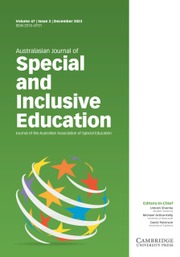Article contents
‘Not Enough Time’: Identifying Victorian Teachers’ Perceptions of the Facilitators and Barriers to Supporting Improved Student Behaviour
Published online by Cambridge University Press: 17 May 2021
Abstract
Students exhibiting behaviours of concern are at increased risk of poor outcomes during their school years. The implementation of school-wide positive behavioural interventions and supports (SWPBIS) has repeatedly been shown to be an effective, evidence-based approach that supports teachers to select and adopt effective practices to meet the social and behavioural needs of all learners. Implementation of SWPBIS within Australian schools is increasing. Although there is considerable evidence supporting the effectiveness and efficacy of SWPBIS as a means to improve the behavioural outcomes of all students, these positive outcomes largely depend on the actions of teachers. To this point, very limited research has been published that explores the experiences of teachers working in Australian schools currently implementing SWPBIS. The current study asked 206 Victorian teachers working in schools implementing SWPBIS two open-ended questions about the factors that they believed were facilitators or barriers to their ability to improve the behavioural outcomes of their students. The most commonly reported facilitators were availability of time, consistency of staff implementation of behaviour support, and adequate training. The most frequently identified barriers were a lack of time and inconsistent implementation. The practical and research implications of these preliminary qualitative findings are discussed.
Keywords
- Type
- Original Articles
- Information
- Australasian Journal of Special and Inclusive Education , Volume 45 , Issue 2 , December 2021 , pp. 205 - 220
- Copyright
- © The Author(s), 2021. Published by Cambridge University Press
Footnotes
This manuscript was accepted under the Editorship of Michael Arthur-Kelly.
References
- 5
- Cited by


